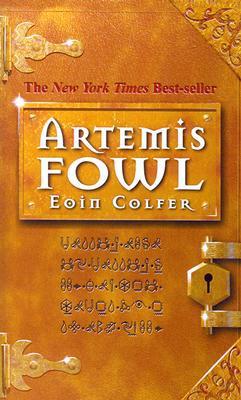 |
| ★★★★★ Goodreads | Amazon |
Fairies.
Leprechauns. Centaurs. Trolls. Magic. These concepts are anything but new to
the modern readers. Every culture has its personal legends about mystical and
magical creatures, fascinating people for generations. But legends told and
retold can soon lose the magic from their storytelling. In his novel, Artemis Fowl, Irish author Eoin Colfer provides a fresh perspective of these tales, avoiding the age-old clichés. A
young-adult fantasy novel, Artemis Fowl
introduces its readers to a fantastical world situated within the context of
the modern-day world. Colfer’s familiar world, wrought with imagination, provides
a useful setting for his exploration of the timeworn tales.
In
a contemporary world lives Artemis Fowl – a genius, a criminal mastermind and a
12-year-old boy. Obviously not the average preadolescent, Artemis discovers
what few humans could ever believe – the existence of fairies. Equipped with the
intellect of an adult, the imagination of a child and the determination to
restore his family’s lost fortune, only he would dare to rob the mythologized
fairy folk of their coveted gold. But separating a fairy from its gold is no
cavalier undertaking. Yet, perhaps foolhardily so, Artemis is just crazy enough
to attempt it (and already presume his success).
The
modern fairy civilization has long distanced itself from the buckled shoes and
knickerbockers of traditional folklore. Nowadays, driven deep underground by
the overbearing human presence found aboveground, fairies uphold a cautious,
protected and technologically-advanced existence, leagues ahead of their human
counterparts. A complex set of races – elves, gnomes, sprites, goblins, dwarves,
pixies, centaurs and more – lives somewhat peaceably together in an underground
city, the Lower Elements, near the Earth’s core. Here, in the Lower Elements, leprechauns
are no longer little old men sitting at the end of a rainbow, counting their golden
coins, but instead LEPrecons – members of the highly-prestigious reconnaissance
unit of the Lower Elements Police. Centaurs can design the most advanced of
technology, dwarves are known for their powerful and noxious flatulence and
goblins shoot fireballs from their nostrils. In the hands of Colfer, the
classic mythical anecdotes acquire new quirks and twists – to the delight of
the readers.
Yet,
even with the luxuries and securities of their advanced society, the fairies
never quite rid themselves of an unwanted and unpleasant human influence –
though not for lacking of trying. The fairy existence revolves around the surface
of the Earth and the human society it contains, for fairy civilization, though portrayed
as the far superior entity, constantly fears detection. After years of
antagonistic interaction aboveground, which spawned the various long-lasting
legends, fairies learned that the two civilizations could not possibly coexist
amiably. Now, to avoid further conflict, the fairy civilization does everything
possible to remain a well-hidden secret.
But Artemis breaches the boundaries between human and fairy. He is determined to bring the two civilizations together again – for his own selfish gain, of course. So, after capturing a careless elf, Holly Short, Artemis begins his unsympathetic relationship with the fairy race, manipulating and conniving in pursuit of his golden ransom. As the back-and-forth antics of fairy and human intensify, it becomes evident that Artemis may have finally met his match – to the readers’ chagrin or, perhaps, pleasure. Colfer encourages his reader to explore the realms of common folklore as it interacts with humanity. Who should the readers support? Fairy or human? Who do they want to win? In this action-filled and wittily humorous novel, Colfer keeps his readers hooked until the very end, always questioning, waiting, wanting answers to the questions only they can answer.
[Note: This is a review of Artemis Fowl I wrote ages ago in school. I am posting it now for no other reason than I love this book and felt like sharing its greatness.]
But Artemis breaches the boundaries between human and fairy. He is determined to bring the two civilizations together again – for his own selfish gain, of course. So, after capturing a careless elf, Holly Short, Artemis begins his unsympathetic relationship with the fairy race, manipulating and conniving in pursuit of his golden ransom. As the back-and-forth antics of fairy and human intensify, it becomes evident that Artemis may have finally met his match – to the readers’ chagrin or, perhaps, pleasure. Colfer encourages his reader to explore the realms of common folklore as it interacts with humanity. Who should the readers support? Fairy or human? Who do they want to win? In this action-filled and wittily humorous novel, Colfer keeps his readers hooked until the very end, always questioning, waiting, wanting answers to the questions only they can answer.
[Note: This is a review of Artemis Fowl I wrote ages ago in school. I am posting it now for no other reason than I love this book and felt like sharing its greatness.]
No comments:
Post a Comment